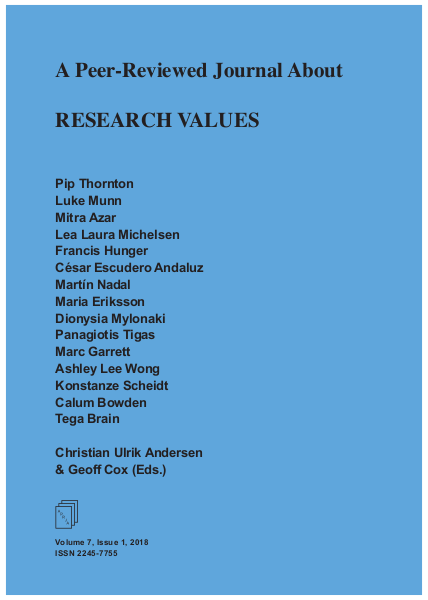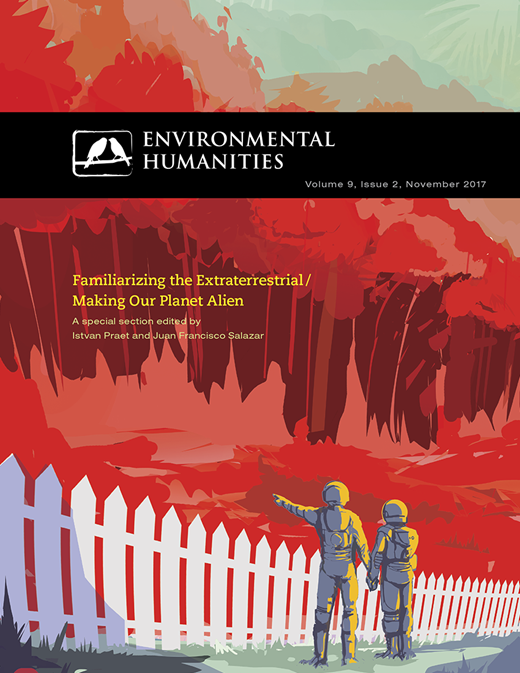A Peer-Reviewed Journal About, 7(1): Research Values (2018)
Filed under journal | Tags: · algorithm, biometrics, cultural politics, database, environment, knowledge, research, value

“There is value and there are values. There is the measure of wealth, metrified and calculated in numerous ways, and there are ideas, ethics, preferences of taste, and customs of ideology. […] But what really happens when the two are conflated? How do we understand how the values associated with something give it value; or, how giving something a value affords certain values? And, in what ways are the conflations of value and values tied to the circulation of value and values in contemporary technical infrastructures? […] The articles published in this issue interrogate value and values in ways that respond to techno-cultural shifts and embrace the range of economies that pervade digital culture.” (from Introduction)
Contributions by Pip Thornton, Luke Munn, Mitra Azar, Lea Laura Michelsen, Francis Hunger, César Escudero Andaluz & Martín Nadal, Maria Eriksson, Dionysia Mylonaki & Panagiotis Tigas, Marc Garrett, Ashley Lee Wong, Konstanze Scheidt, Calum Bowden, and Tega Brain.
Edited by Christian Ulrik Andersen and Geoff Cox
Publisher DARC, Aarhus University, Aarhus, July 2018
Creative Commons Attribution-NonCommercial-ShareAlike License
ISSN 2245-7755
166 pages
HTML, PDFs
PDFs (added on 2019-9-27)
PDF (7 MB, added on 2019-9-27)
Cultural Anthropology: Lessons for Liberalism from the “Illiberal East” (2018)
Filed under journal | Tags: · anthropology, central europe, conspiracy, democracy, east-central europe, eastern europe, fake news, geopolitics, illiberalism, liberalism, politics, populism

“The cumulative effects of Brexit, the resurgence of populist politics in Europe, and the election of Donald Trump as president of the United States have given rise to the perception that Western liberal democracies are undergoing profound change, if not a bona fide crisis. Moreover, there is a sense that it is the political liberalism of the post–Cold War period—rather than its far less popular companion ideology of neoliberalism—that finds itself in disarray. As scholars and commentators rummage through their intellectual toolboxes for explanatory frameworks, many are turning to (post)socialist histories and experiences as heuristic devices for making sense of the upheavals in Western politics. In this Hot Spots series, we suggest that the postsocialist transition, as both discursive space and set of practices that attempted to make capitalists out of socialists and liberals out of totalitarians, renders the former socialist world a rich site for understanding the current shifts in the Western political landscape. We aim to make sense of this landscape in a way that is attuned to both long-term processes and to the state of emergency reinforced with each new wave of current events. Even though the ground appears to be constantly shifting beneath our feet, these essays insist that detailed, historically and geopolitically sensitive analysis of actually existing post–Cold War liberalisms is one key approach for making sense of the present.”
Edited by Dace Dzenovska and Larisa Kurtović
Publisher Society for Cultural Anthropology, Apr 2018
Hot Spots series
ISSN 1548-1360
Environmental Humanities, 9(2): Familiarizing the Extraterrestrial / Making Our Planet Alien (2017)
Filed under journal | Tags: · alien, astronomy, cosmos, earth, extraterrestrial, imagination, life, science, space

“A growing number of researchers in the social sciences and the environmental humanities have begun to focus on the wider universe and how it is apprehended by modern cosmology. Today the extraterrestrial has become part of the remit of anthropologists, philosophers, historians, geographers, scholars in science and technology studies, and artistic researchers, among others. And there is an emerging consensus that astronomers and other natural scientists—contrary to a common prejudice—are never simply depicting or describing the cosmos “just as it is.” Their research is always characterized by a specific aesthetic style and by a particular “cosmic imagination,” as some have called it. Scientific knowledge of the universe is based on skilled judgments rather than on direct, unmediated perception. It is science, but it is also an art. This special section focuses on two at first sight contradictory aspects of this cosmic imagination. On the one hand, there is a distinctive move toward viewing the extraterrestrial in familiar terms and comprehending it by means of conceptual frameworks that we, earthlings, are accustomed to. On the other hand, there is a tendency to understand our own planet in unfamiliar terms, especially in astrobiology, where so-called analog sites and “extreme environments” provide clues about alien planets.”
Special section edited by Istvan Praet and Juan Francisco Salazar
Publisher Duke University Press, November 2017
Creative Commons BY-NC-ND 3.0 License
ISSN 2201‐1919
pages 300-455

